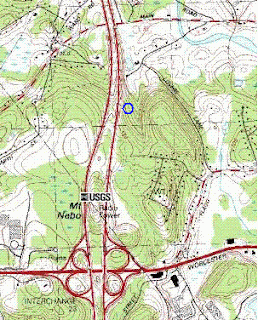 But this time I looked at the map before picking a direction, and decided to head for the low lands. I thought I would go around the "Water Tank" hill, counter clockwise, and started out heading down into the gully south of the hill, where I saw a first sign of ceremonial structure:
But this time I looked at the map before picking a direction, and decided to head for the low lands. I thought I would go around the "Water Tank" hill, counter clockwise, and started out heading down into the gully south of the hill, where I saw a first sign of ceremonial structure: Was this deliberate? Here is another view over the structure down to the little brook forming there.
Was this deliberate? Here is another view over the structure down to the little brook forming there. Actually a gateway opening towards the water, or a blocked gateway like this, is a typical structure where water comes out of the ground.
Actually a gateway opening towards the water, or a blocked gateway like this, is a typical structure where water comes out of the ground.Continuing downstream, I thought I saw a rock pile at the foot of a tree and, stepping over a log to get there, stepped right onto a rock pile.
 And then as I looked around I found a number of others. Most of them were oval ground piles. I found maybe 11 of them, scattered around underneath the trees:
And then as I looked around I found a number of others. Most of them were oval ground piles. I found maybe 11 of them, scattered around underneath the trees: Here are two of the nicer examples.
Here are two of the nicer examples.
 All of these piles are in a flat area at the foot of a hill (the "Water Tank" hill) with brooks coming in from the north and west - to either side of the hill. Places likes this where brooks meet, at the confluence of brooks, are a common place to find rock piles. Such a site was mentioned recently by TheSeventhGeneration [see also here].
All of these piles are in a flat area at the foot of a hill (the "Water Tank" hill) with brooks coming in from the north and west - to either side of the hill. Places likes this where brooks meet, at the confluence of brooks, are a common place to find rock piles. Such a site was mentioned recently by TheSeventhGeneration [see also here].Although these piles are somewhat "grave-like", there are a couple of reasons I do not think so. Firstly, putting graves near a water supply does not make good sense. Secondly, no quartz. Also those gateways.


















































